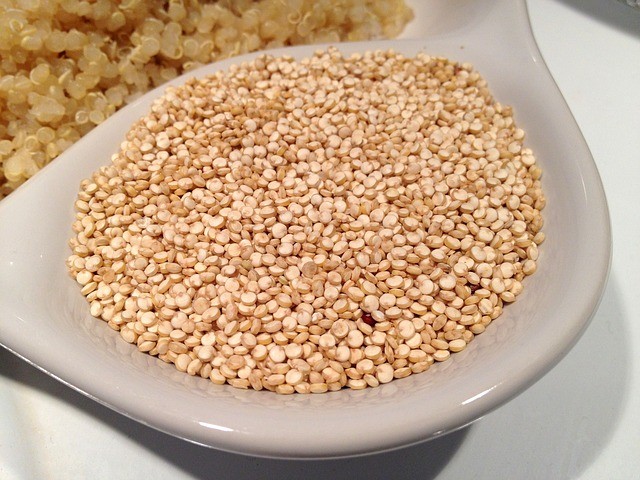Learn the good thing quinoa can give us. Check out the article we found over at Mercola.com.
Eating a bowl of quinoa a day may lower your risk of premature death from diseases like cancer, heart disease, respiratory disease, and diabetes by 17 percent. This was the finding from a Harvard School of Public Health study, which followed more than 367,000 people for about 14 years.
Those who ate about 1.2 ounces (34 grams) of quinoa per 1,000 kcal daily enjoyed the lowered risk of all-cause mortality. Unfortunately, the researchers lumped quinoa in with other whole grains and cereal fibers, even though quinoa is not a grain at all – it’s a seed.
Even the US Whole Grains Council featured quinoa as a whole grain of the month, so it’s no wonder so many are confused. Even the Whole Grains Council admitted:
“Quinoa… is in fact not technically a cereal grain at all, but is instead what we call a ‘pseudo-cereal’ – our name for foods that are cooked and eaten like grains and have a similar nutrient profile. Botanically, quinoa is related to beets, chard, and spinach, and in fact the leaves can be eaten as well as the grains.”
But make no mistake, while quinoa can be a healthy addition to your diet, I would not recommend feasting on whole grains; the two are quite different in terms of their nutritional value and effects on your health.
Quinoa Contains Both Healthy Fats and Protein
Quinoa is often described as the highest-protein “grain” (again, even though it’s a seed), and this is because it’s actually a complete protein. There are nine essential amino acids that you must get via your diet, as your body does not make them on its own.
Foods that supply all of the essential amino acids are generally known as “complete” proteins, while those that do not are known as “incomplete” proteins. Most grains lack adequate amounts of the amino acids lysine and isoleucine, making them incomplete proteins.
Quinoa, however, has higher amounts of both lysine and isoleucine, making it a complete protein. It is a particularly good source of lysine, which is important for immune system health, muscle repair, and may even reduce anxiety.
There are about 24 grams of protein in one cup of quinoa, compared to about five grams in a cup of rice, and quinoa has 25 percent more protein than refined grains. In addition, quinoa is a valuable source of healthy fats, unlike most grains.
Close to 30 percent of the fatty acids in quinoa come from oleic acid, the same monounsaturated fatty acid found in olive oil and linked to reduced blood pressure and heart disease risk. About 5 percent of quinoa’s fatty acids are alpha-linolenic acid (ALA), a beneficial form of plant-based omega-3s. Also noteworthy, as Live Science reported:
“Most foods lose their healthy fatty acids when oxidized, but quinoa’s nutrients hold up to boiling, simmering, and steaming.”
Quinoa May Boost Heart Health, Lower Diabetes Risk
Quinoa contains a wealth of nutrients that are good for your heart, including monounsaturated fats. In one study published in the European Journal of Nutrition, consuming quinoa led to lower levels of triglycerides and free fatty-acids, which is associated with a lower risk of heart disease, than other gluten-free grains.
Research also suggests quinoa has a favorable effect on blood sugar levels and may even help lower diabetes risk. In a study of rats fed a high-fructose diet, it was shown that “quinoa seeds can reduce most of the adverse effects exerted by fructose on lipid profile and glucose level.”
Further, in a study of 10 traditional Peruvian grains, quinoa had the highest antioxidant activity, which the researchers believed may be useful for helping to manage type 2 diabetes and high blood pressure. And as noted by the George Mateljan Foundation:
“With respect to type 2 diabetes, quinoa simply has too many things in common with other foods known to decrease risk. At the top of the list here would be its fiber and protein content. Quinoa is a good source of fiber—one of the key macronutrients needed for healthy blood sugar regulation.
It also provides outstanding protein quality, even in comparison to commonly-eaten whole grains. Strong intake of protein and fiber are two dietary essentials for regulation of blood sugar. Because chronic, unwanted inflammation is also a key risk factor for development of type 2 diabetes, the diverse range of anti-inflammatory nutrients found in quinoa also make it a great candidate for diabetes risk reduction.”
Quinoa Can Be Eaten Hot or Cold, for Breakfast, Lunch, or Dinner
Quinoa’s nutritional profile makes it a smart choice for your health, especially in favor of grains, but its simplicity and versatility makes it an easy choice as well. You can easily substitute quinoa or quinoa flour for grains and grain flours in recipes. It cooks up in under 15 minutes, and has a mild nutty flavor and chewy texture that works well with a variety of flavors, hot or cold. Try quinoa in salads, soups or stews, as a breakfast porridge, and as a healthy side dish. You can even find quinoa noodles.
In fact, any time you’re tempted to reach for a grain, make it a habit to substitute quinoa instead. It’s an easy way to add valuable nutrition to your diet while avoiding the many pitfalls of eating too many grains.
Next Article: The Recipe That You Need To Get Your Kids To Try Quinoa
Read full article: Are You Curious About Quinoa?







Patricia Fleming
Mar 15. 2016
Joe Collins
Rosemarie Cervellero
Mar 15. 2016
Nicolas Robinson
Patricia Skinner
Mar 15. 2016
I am so allergic to quinoa
Julia Davis
Mar 16. 2016
Truly a blessing
Maria Saladino
Mar 16. 2016
Yes all true, but not good for those with autoimmune disease
Extreme Natural Health News
Mar 16. 2016
Thanks for all your comments, we truly appreciate everyone putting in their opinions. It helps others!
Keren Garza
Mar 16. 2016
Victoria Jordan this might help you
Victoria Jordan
Mar 16. 2016
Aw thanks lovely!
Keren Garza
Mar 16. 2016
No problem 🙂
Robin Mackay
Mar 16. 2016
Maria why is it not good for those with autoimmune? I would like to know. I love quinoa. my sister had an auto-immune disease and I am constantly watching my blood levels to be cautious that I don’t develop it. But would like to know the answer. Don’t want to be doing myself any harm
Oil Supplements
Nov 11. 2017
+1
Maria Fattore
Nov 12. 2017
Good for kidney ??? Kidney diseased ?